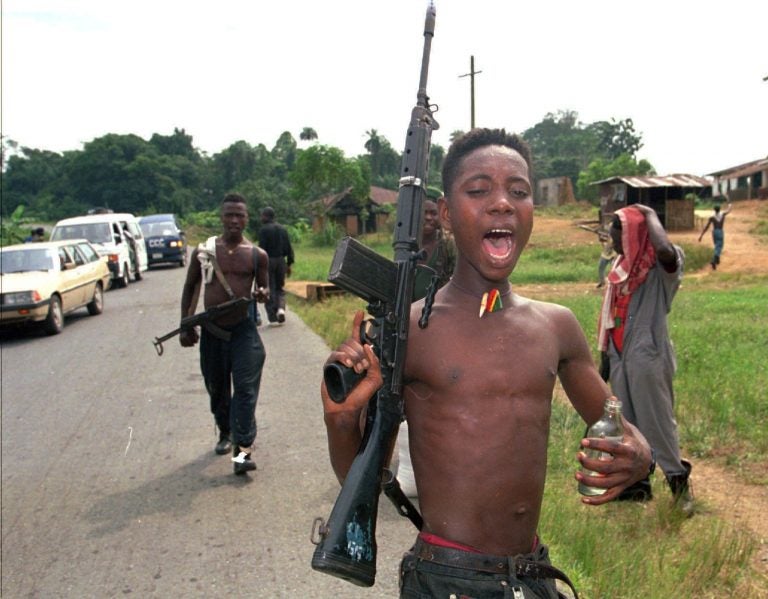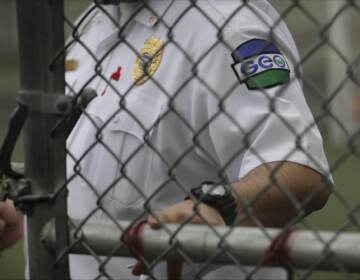Accused of war crimes in Liberia, 'Jungle Jabba' found guilty of fraud, lying on asylum documents about his past
A federal jury in Philadelphia has convicted former rebel commander Mohammad Jabbateh of lying about his involvement in mass atrocities during Liberia’s first civil war.
Listen 2:29
An intoxicated young rebel with the United Liberation Movement of Liberia (ULIMO), shouts while walking along the highway leading to Tubmanburg, 40 miles northwest of the capital Monrovia, Tuesday January 9, 1996. (Jean-Marc Bouju/AP Photo)
A federal jury in Philadelphia has convicted former rebel commander Mohammad Jabbateh, known as “Jungle Jabbah,” of lying on asylum documents about his involvement in mass atrocities during Liberia’s first civil war in the 1990s.
Jabbateh, 51, a father and businessman who has lived for two decades in Delaware County, now faces the maximum punishment of 30 years in federal prison after he was found guilty of fraud and perjury Wednesday afternoon. He has been in federal custody since his arrest last April.
“Today is a very significant day for justice in Liberia,” said Alain Werner, a Geneva, Switzerland-based international human rights lawyer with Civitas Maxima, which has worked with hundreds of Liberian war victims. “It’s the first time ever that you have a criminal conviction of crimes that happened during the first civil war in Liberia,” he said. “It’s very important to the victims.”
During the two-week trial, prosecutors said Jabbateh was running from his violent past when he won permanent legal residency in the United States after officials granted him asylum in 1999.
Authorities called more than a dozen witnesses who testified that Jabbateh took part in the mass murder, rape, and ritual cannibalism of defenseless villagers in Liberia during the seven-year war that ended in 1998. Prosecutors said Jabbateh led brigades of rebels through the diamond and gold mines in the country’s western hills and wrought brutal bloodshed, leaving a trail of bodies and misery in his wake.
Despite the thousands killed during Liberia’s first civil war, Liberian officials have not held anyone criminally responsible for war crimes committed during that time.
An international tribunal in the Netherlands in 2012 convicted Liberia’s former President Charles Taylor for his role in war atrocities that occurred in neighboring Sierra Leone, but many in Liberia feel that justice over what happened there remains elusive.
‘Heinous crimes’ not focus of trial
Assistant U.S. Attorney Linwood Wright, one of the lead prosecutors on the case, said though Jabbateh was not on trial for brutalizing civilians, being found guilty for lying about those deeds may provide relief to Liberians who feel that war criminals have escaped consequences.
“We’re hopeful that there are Liberians who will feel a sense of justice, but that wasn’t one of our considerations,” said Wright, noting that the trial’s focus was on fraud connected with lying to U.S. immigration officials, violations of U.S. federal law — and not for war crimes.
“We think that these crimes were heinous and we think that the jury verdict supported that, that they can’t seek safe haven in the United States.” Wright said.
The Philadelphia area is among the largest Liberian immigration communities in the country. Dozens of Liberian emigres came to the federal courthouse in Center City to witness the proceedings, just as countless others watched from across the Atlantic in Liberia. A sizable contingent of Liberian-Americans supporting Jabbateh agreed with his defense team’s position that the prosecution was politically motivated.
During some days, his supporters stood in front of the courthouse holding signs that read, “Jabbateh is a victim of civil war. Let Jabbateh go free.”
Unsophisticated vetting
Asked why U.S. immigration authorities did not originally catch Jabbateh’s past as a rebel commander during his vetting process in the late-1990s, Wright placed the blamed on unsophisticated technology.
“That was in a different era. It doesn’t seem like it was that long ago. But it was in 1999, when we had a different way of doing things,” Wright said. “We had a different way of compiling information. You couldn’t do the instant searches, you can do some searches, but you couldn’t do the instant searches you can do now.”
On his immigration forms, Jabbateh wrote that he was a Monrovia-based bodyguard with the Special Security Service, the Liberian equivalent of the Secret Service. When former President Taylor rose to power in Liberia, Jabbateh claimed he was beaten up and detained by Taylor’s forces for belonging to the rebel group United Liberation Movement for Democracy, which opposed Taylor’s rule.
While some of those details are disputed, prosecutors said one thing is clear: Jabbateh never gave any indication that he committed and directed soldiers to undertake lethal humanitarian crimes.
“It was about lies,” Wright said. “Now the evidence of the lies were the crimes that were committed in Liberia, but that doesn’t change was the case was about.”
Political motivations alleged
Jabbateh’s defense lawyer, Greg Pagano, maintained during the trial that the prosecution was politically motivated, arguing that the government’s key witnesses were members of a rival tribe. Pagano also underscored that authorities did not have any forensic evidence documenting proof the Jabbateh was directly involved in the country’s violence.
Pagano made an effort to highlight how much U.S. authorities pumped into the investigation, including five fact-finding trips to Liberia to interview witnesses about atrocities that occurred two decades before.
“It’s when the U.S. government comes to town, when the world’s superpower comes to town, that these allegations come about,” he told the jury.
After the verdict, Pagano reiterated that sentiment.
“Yeah, I mean, we don’t have the resources to go to Africa and investigate this case,” Pagano said.
He would not yet say whether he plans to appeal.
“We, of course, respect the jury’s decision,” he said. “We disagree with it, but we respect it.”
WHYY is your source for fact-based, in-depth journalism and information. As a nonprofit organization, we rely on financial support from readers like you. Please give today.




